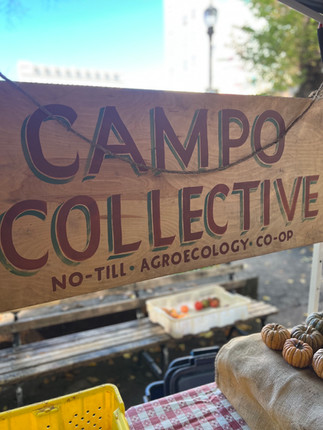Discover the transformative force of CAMPO Collective, an innovative, collectively owned and operated non-profit farm in Hillsboro just outside of Portland, Oregon! Going beyond sustainable production methods, the heart of CAMPO Collective is centered on building a sustainable community. In close partnership with the Western Farmworker Association, their work is actively transforming Hillsboro's farmland into a vibrant educational and economic hub for the Hillsboro region's farmers and farmworkers. With a diverse and passionate team, CAMPO's uniquely inclusive model lies at the crossroads of agriculture, social justice, and community-building. Read on for more of the CAMPO story and incredible photos captured by Shawn Linehan.

What Does CAMPO stand for?
"COLABORACIÓN AGRICOLA MOBILIZANDO PODER ORGÁNICO"
"C is colaboración and cooperación. Our educational models use popular education to bring people together for a purpose, to learn Agricultura and build a Movimiento that makes land and resources available to responsible farmers. We educate ourselves collectively to build Poder with the earth in mind, Orgánicamente." - www.campopdx.org
Meet the Collective
At the heart of CAMPO Collective is a diverse and passionate team of farmers and educators, including Uriel de Leon, Margarita 'Mago' Reyes, Marisela Bautista Martinez, Zeferina Rodriguez Luna, Jade Novarino, and Jesse Nichols. Together, they've created a unique model that combines education, agriculture, and collective action that centers farmworkers and feeds Hillsboro’s Latino community.

Many of the skilled farmers who have found their way to CAMPO Collective come from agricultural backgrounds in Central America and bring traditional ecological knowledge and experience to the farm. However, as we joined the team in a greenhouse being cleared out for the winter, folks shared how this knowledge wasn't appreciated on other farms in the US.
Pausing work for a moment and leaning on shovels, folks shared that in their experience working on farms in the states, efficiency is all that mattered. Often, Zeferina said, you’d be working on the same task all day long for weeks on end, and it didn’t matter if you had an idea on how to make something better or if you wanted to learn another skill.

“Aquí es diferente,” she continued, “here it’s different.” What’s unique about CAMPO is that this knowledge and experience is centered in how the team manages production. From low-till practices to culturally-specific crop selection and animal rotation, CAMPO's regenerative farming practices go beyond the scope of any certification. Educational opportunities are also made available to all team members and the community at large, including classes on soil health, no-till methods, agroecology principles, etc. that allow all members of the Collective to learn new skills and decide how to implement them on farm year to year.
Markets and Sales

CAMPO's distinctive model also allows cooperative members to farm both independently and collectively, specializing in crops that align with their expertise and preferences. Last season, Uriel, who owns and operates De Leon’s Farm in collaboration with Campo, grew the majority of cherry tomatoes last season as well as Chayote, a variety of summer squash beloved throughout Central America. Likewise, Margarita owns and operates Reyes Family Produce alongside her work with CAMPO, selling strawberries, an impressive variety of chiles, and more. This unique collective model fosters a sense of ownership and sustainability that allows all its farmer members to take pride in their work and reap the benefits of their labor.
And as a non-profit, CAMPO is uniquely positioned to empower and serve its local community. Half of their production is destined for contracts with food banks in collaboration with the Western Farmworker Association, supporting the Latino and Indigenous community in a direct and impactful way. They also sell to local restaurants, at farmers markets, and offer a CSA.
Regenerative Practices

CAMPO embraces regenerative practices inspired by the resilience of traditional farming, where diversification has always played a key role. Rather than relying on off-farm inputs, CAMPO aims to cultivate on-site fertility using proven methods like cover cropping and livestock rotation. Each year the farm developsmore sustainable growing practices, drawing inspiration from experiences like farmer Uriel's rotation of sheep and goats.
CAMPO takes a forward-thinking, multi-seasonal approach to field preparation and soil health takes center stage. Preparing a field may begin several seasons prior, introducing cover crops like nitrogen-fixing fava beans to enhance soil quality right on the farm. Positioned at the forefront of sustainability, CAMPO explores cutting-edge no-till production methods, such as deep compost mulching. By avoiding tillage, the soil’s structure and biology can flourish undisturbed. The deep compost mulching method minimizes the need for weeding by burying weeds beneath several inches of weed-free, biologically dense compost. Thanks to this eco-friendly approach, CAMPO successfully grows delectable veggies without relying on plastic, resulting in the weed-free rows of beets and carrots we walked past, along with perennial labor savings.
CAMPO Collective is not just a farm; it's a movement towards sustainable agriculture, education, and community empowerment. Their innovative approach, rooted in collaboration and regenerative practices, serves as a beacon of hope for the future of farming. Their vision suggests that cultivating change can begin with the soil beneath our feet and the people around us.
Big thanks to Shawn Linehan for joining us on this farm visit and capturing the beauty of CAMPO Collective with these beautiful photos. You can find more of her work here, support Campo Collectivo's mission by donating here, and become a part of the agricultural revolution being grown just outside of Portland.














Comments